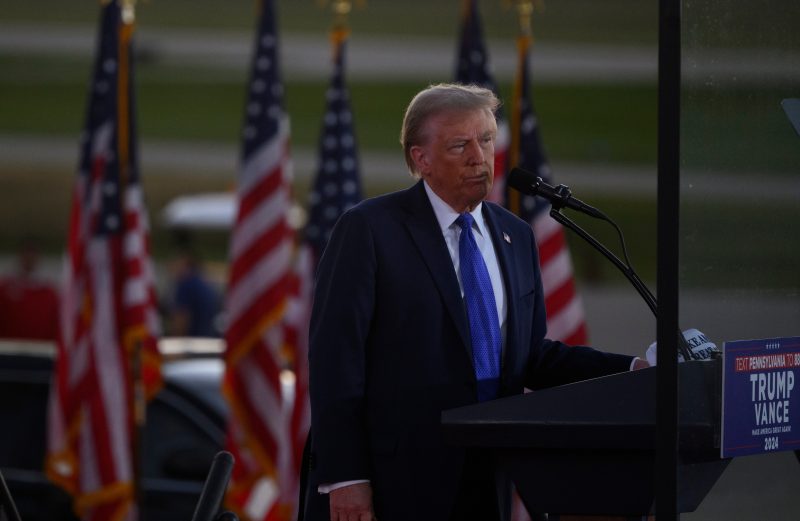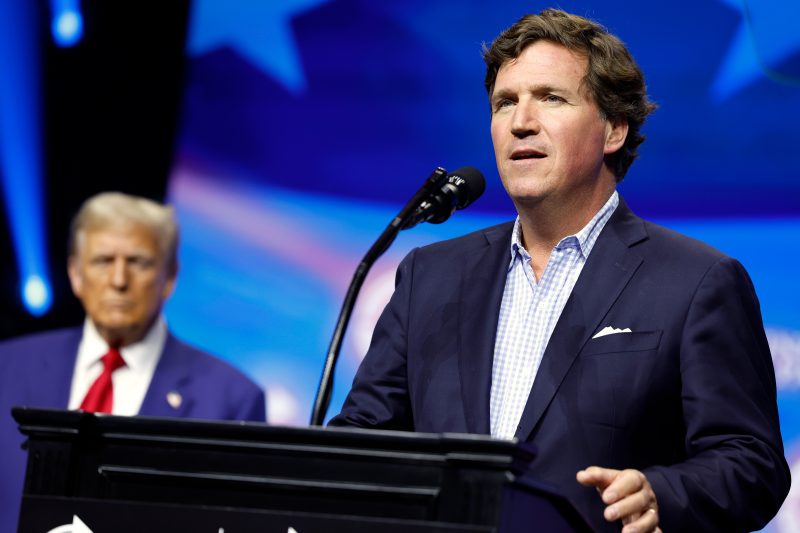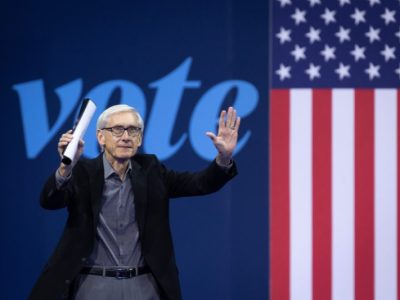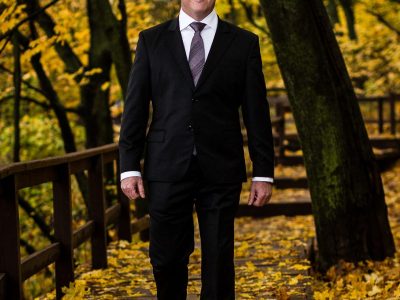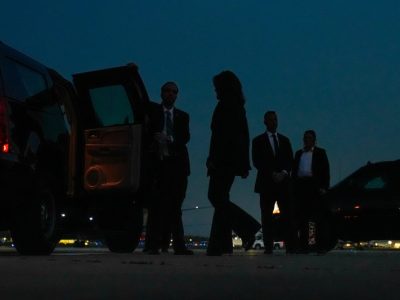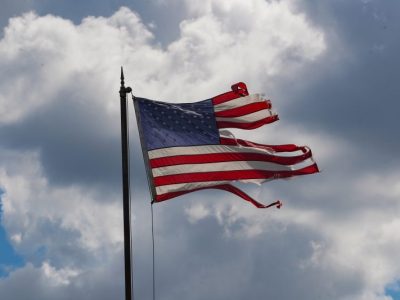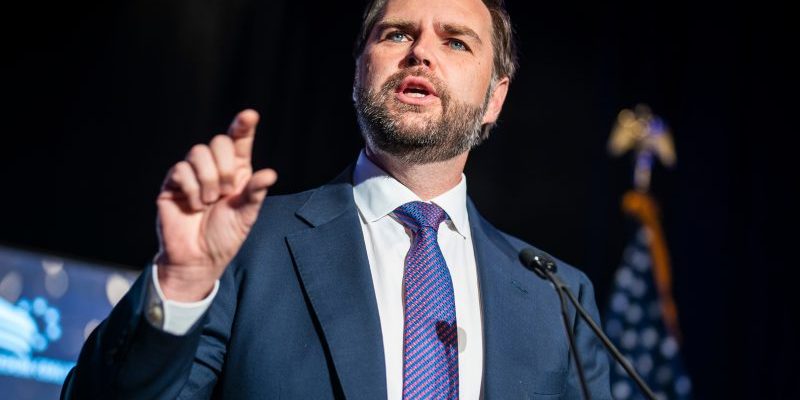
Donald Trump “was president for four years, and he didn’t go after his political opponents. You know who did go after her political opponents? Kamala Harris, who has tried to arrest everything from pro-life activists to her political opponents … and used the Department of Justice as a weapon against people.”
— GOP vice-presidential candidate JD Vance, during an interview with Martha Raddatz on ABC’s “This Week,” Oct. 13
At almost the same moment Vance made this comment, in response to a question about whether Trump in a second term would “go after his political opponent,” Trump, Vance’s running mate, was on Fox News, speaking to host Maria Bartiromo about his concerns about the election.
“I think the bigger problem is the enemy from within,” Trump said. “We have some very bad people. We have some sick people, radical left lunatics. And I think they’re the — and it should be easily handled by, if necessary, by National Guard, or if really necessary, by the military, because they can’t let that happen.”
It’s a familiar pattern of a Trump surrogate playing down Trump’s words and actions — and then Trump almost immediately blasting past the talking point. In this instance, he suggested he would use the military, not just the Justice Department, to go after political opponents.
For context, Raddatz noted that Vance had said the second-most-important person in a second Trump administration would be the attorney general. She asked why he said that. He replied, “You need people to believe that if the attorney general prosecutes somebody, it’s motivated by justice and law, and not by politics.” She cut in: “Would Donald Trump go after his political opponents?”
That’s when Vance asserted Trump didn’t go after his political opponents when he was president — unlike Harris. Harris, of course, is vice president, without direct authority over prosecutors, so we’ll assume he was using her as a proxy for President Joe Biden.
“He didn’t say people are going to go to jail because they disagree with me,” Vance claimed. “That is, in fact, been the administration and the policy of Kamala Harris.”
We pressed the Vance staff for specific examples to make his case. We mostly received misleading statements, which we will examine below. As best we can tell, Vance appears to be absolving Trump because he was not successful at winning prosecutions of his foes.
What Trump did
Extensive news reporting and government probes have documented how Trump repeatedly sought to influence or direct the course of Justice Department investigations, sometimes successfully. Specifically regarding political opponents, the website Just Security compiled a handy list of times when Trump sought to prosecute his perceived enemies. There are other examples listed in a recent New York Times report, which was titled “As president, Trump demanded investigations of foes. He often got them.”
Here’s a quick list of what Trump did:
Sought investigation of Hillary Clinton. The report by special counsel Robert S. Mueller III documented that Trump in 2017 pressed then-Attorney General Jeff Sessions to “un-recuse” himself from overseeing the election campaign investigation so he could order an investigation of Clinton.
Scolded Justice Department for failing to investigate Clinton. In both a radio interview and on Twitter in 2017, Trump urged an investigation. “People are angry,” he tweeted. “At some point the Justice Department, and the FBI, must do what is right and proper. The American public deserves it!”
Called for investigations of Clinton and the debunked Uranium One conspiracy theory. A U.S. attorney was tapped to start the probe in late 2017, but it ended in 2020 with no action.
Demanded an investigation of the Clinton Foundation. Little Rock prosecutors in 2018 issued a grand-jury subpoena for foundation records. The case was closed without charges just days before Trump left office.
Trumpeted the firing and then near-prosecution of former FBI deputy director Andrew McCabe. “Andrew McCabe FIRED, a great day for the hard-working men and women of the FBI — A great day for Democracy,” Trump tweeted after McCabe was fired 26 hours before he was due to retire, depriving him of his pension. (He won it back after a lawsuit.) A criminal probe was launched into whether McCabe lied to FBI agents. No charges were brought, and there is evidence a grand jury declined to issue an indictment.
Demanded an investigation of former president Barack Obama over debunked “Spygate” claims. “I hereby demand, and will do so officially tomorrow, that the Department of Justice look into whether or not the FBI/DOJ infiltrated or surveilled the Trump Campaign for Political Purposes — and if any such demands or requests were made by people within the Obama Administration!” Trump wrote on Twitter in 2018. Various probes found no evidence.
Told the White House counsel in 2018 that he wanted to order the Justice Department to investigate Clinton and former FBI director James B. Comey. The counsel refused, saying Trump had no authority to do so. The Justice Department under Trump conducted two investigations of Comey related to leaking, but no charges were brought.
Sought Internal Revenue Service investigations of Comey and McCabe. John F. Kelly, Trump’s second White House chief of staff, told the New York Times that Trump repeatedly sought IRS probes of the two former FBI officials. Both men were selected for a rare and highly intrusive audit by the tax agency, at a time the agency was headed by a Trump appointee, but the agency insisted they were randomly selected.
Attacked former secretary of state John F. Kerry on Twitter in 2018 for having contacts with Iranian diplomats, suggesting he had violated the Logan Act, which prohibits negotiations with a foreign government by unauthorized citizens. Almost immediately, the Justice Department ordered prosecutors in Manhattan to investigate Kerry. Geoffrey Berman, the U.S. attorney in Manhattan at the time, wrote in a memoir that a year later, when Trump again tweeted that Kerry had broken a law, the Justice Department followed up to find out why certain investigative steps had not been taken. When Berman’s office decided there was no case, the Kerry probe was assigned to another U.S. attorney — who came to the same conclusion.
In 2018 on Twitter, demanded that the attorney general investigate a long list of subjects (such as the Clinton Foundation) and several people, including Clinton, Comey and McCabe. After the release of Mueller’s report in 2019, then-Attorney General William P. Barr appointed U.S. Attorney John Durham to investigate the origins of the FBI probe into Trump’s alleged Russia connections. The probe eventually included examination of Clinton and her inner circle, and how law enforcement agencies handled allegations of corruption at the Clinton Foundation. The Durham probe was a bust, with every case going to trial ending in acquittal.
Pressed Ukrainian President Volodymyr Zelensky to open an investigation of Biden, who was planning to run for president. A rough transcript of a July 2019 phone call showed that Trump made eight distinct requests for assistance in a Biden investigation. By early September, Zelensky was so desperate for the aid that Trump had frozen to be released, he agreed to an interview with CNN in which he would announce a probe of Biden. But he canceled the interview after a whistleblower report on the Trump call became public — which led to Trump’s first impeachment.
Threatened to prosecute Georgia Secretary of State Brad Raffensperger if he refused to help Trump “find” the necessary votes to overturn his loss of the state to Biden. “It is more illegal for you than it is for them because you know what they did and you’re not reporting it,” Trump told Raffensperger in a 2021 phone call. “That’s a criminal, that’s a criminal offense. And you can’t let that happen.”
By any reasonable measure, this list shows that Trump did “go after” his political opponents — but he was notably unsuccessful in winning any prosecutions. His political opponents often had to hire lawyers, sit for interviews and cough up documents. But to Trump’s frustration, no crimes were uncovered that warranted prosecution. Durham did manage to obtain one relatively minor guilty plea but failed twice when he went to trial — and none of the people charged by Durham were significant enough to be considered Trump’s political opponents.
What Biden or Harris did
Trump has been indicted twice by federal prosecutors — for his alleged role in the Jan. 6, 2021, attack on the Capitol and for allegedly mishandling classified documents. (The documents case was dismissed on procedural grounds, a decision under appeal.) But there is zero evidence — certainly no tweets or public comments — that either Biden or Harris requested that Attorney General Merrick Garland investigate Trump’s action in either matter.
Regarding the Jan. 6 case, The Washington Post reported last year that the Justice Department took a methodical, bottoms-up approach that initially focused on the rioters and resisted a direct investigation of Trump. “The Justice Department’s painstaking approach to investigating Trump can be traced to Garland’s desire to turn the page from missteps, bruising attacks and allegations of partisanship in the department’s recent investigations of both Russia’s interference in the 2016 presidential election and Hillary Clinton’s use of a private email server,” the Post report said, adding that some Justice Department lawyers “have complained that the attorney general’s determination to steer clear of any claims of political motive has chilled efforts to investigate the former president.”
The New York Times in 2022 reported that Biden privately also expressed frustration. “As recently as late last year, Mr. Biden confided to his inner circle that he believed former President Donald J. Trump was a threat to democracy and should be prosecuted, according to two people familiar with his comments,” the Times reported. “And while the president has never communicated his frustrations directly to Mr. Garland, he has said privately that he wanted Mr. Garland to act less like a ponderous judge and more like a prosecutor who is willing to take decisive action over the events of Jan. 6.”
When Trump announced he was running for president, Garland appointed a special counsel to take charge of the investigations of the former president so political appointees would not have a role. The two indictments were brought by the special counsel, Jack Smith. Garland also appointed a special counsel to investigate Biden, after it was discovered he had retained classified documents. No charges were brought. Garland also appointed a special counsel to investigate Biden’s son Hunter on gun and tax charges. That prosecutor filed two cases that resulted in a guilty verdict and guilty plea.
As for Vance’s reference to Harris going after “pro-life activists,” the campaign pointed to the indictment of antiabortion activist Mark Houck, who was found not guilty in 2023 on federal assault charges concerning a shoving incident with an abortion clinic escort in Philadelphia. Local prosecutors had declined to prosecute Houck, and a private lawsuit by the clinic escort, Bruce Love, was dismissed, but then the Justice Department brought charges anyway, using the 1994 Freedom of Access to Clinic Entrances (FACE) Act. During the trial, U.S. District Judge Gerald Pappert, an Obama appointee, referred to the FACE Act and asked prosecutors, “Doesn’t that statute seem to be stretched a little thin here?” The jury issued a quick acquittal.
In November, Houck and his wife sued the Justice Department and FBI for malicious prosecution. The campaign also pointed to the case of another activist, Paul Vaughn, who was convicted of violating the FACE Act but given no jail time. We could find no link between Harris and the decisions to prosecute these men.
Vance’s response
Taylor Van Kirk, a spokeswoman for Vance, first sent us this statement: “The double standard of the liberal media is laughable at this point. It is indisputable that under Kamala Harris and Joe Biden’s DOJ, the Republican nominee for President was targeted and indicted, while under President Trump, nothing like that ever transpired against either of the Democrats he faced off with in 2016 or 2020. Actions matter and Senator Vance was 100 percent correct that despite pressure from many Republicans to indict Hillary Clinton for her mishandling of classified information, President Trump never crossed that rubicon the way Kamala and Joe did.”
There are several factual problems with this statement. As we noted, a special counsel brought the charges against Trump. Under Vance’s peculiar logic, Biden also directed the indictment and prosecution of his own son. Moreover, Vance, his spokeswoman’s response suggests, seems to regard an inability to win a prosecution as evidence that Trump “didn’t go after” his opponents. The Trump campaign often portrays Biden as an incompetent old fool, yet in this instance the campaign suggests he’s a cannier political operative than Trump, able to demand a prosecution with the snap of his fingers.
We made these points to Van Kirk, who then sent this statement: “The Washington Post is purposefully gaslighting the Trump-Vance campaign because this insufferable newspaper fails to clarify that Senator Vance was talking about political opponents under Trump’s Administration never being indicted.”
As additional evidence, the campaign supplied links to a CNN report that in November 2016, two weeks after the election, Trump backed away from a pledge to appoint a special counsel to investigate Clinton. As noted above, he changed his mind yet again, and Clinton was subjected to several criminal investigations. Not enough evidence was found to bring an indictment.
The campaign also supplied a link to an opinion article, co-written by former George W. Bush Justice Department official John Yoo, that was titled “Biden DOJ crossed political Rubicon with Trump indictment.” The article concerned the classified-documents case, noting that even if Trump’s actions were criminal, his status as a former president should have been a consideration. “There are good reasons for prosecuting someone who has taken classified information, such as ending the risk of disclosure or deterring future lawbreakers,” the article said. “But history has recognized weightier reasons for leaving former presidents alone.”
Yoo did not respond to a request for comment. However, he and his co-author have also written critically on the Jan. 6 case and applauded the Supreme Court’s ruling on presidential immunity as ending the “partisan, misguided efforts to use the criminal-justice system to eliminate viable presidential candidates.”
The Pinocchio Test
The Vance campaign now says that when the candidate refers to going after political opponents he’s referring to indictments. That wasn’t the question he was asked.
The record clearly shows that while no indictment was brought against Trump’s political opponents during his presidency, it wasn’t for lack of trying. Trump demanded investigations of numerous people. The Justice Department dutifully conducted the probes. But not enough evidence was found to bring an indictment. In one case, the evidence was so lacking that the grand jury reportedly refused to indict — a rare occurrence.
In the case of Trump’s indictments, a special prosecutor found enough evidence to convince two grand juries to issue indictments — with no discernible role by the president or vice president in either the launching of the probe or the issuing of the indictment. That’s a world of difference, even though Vance tries to spin it as deliberate.
Vance earns Four Pinocchios.
Four Pinocchios
(About our rating scale)
Send us facts to check by filling out this form
Sign up for The Fact Checker weekly newsletter
The Fact Checker is a verified signatory to the International Fact-Checking Network code of principles


